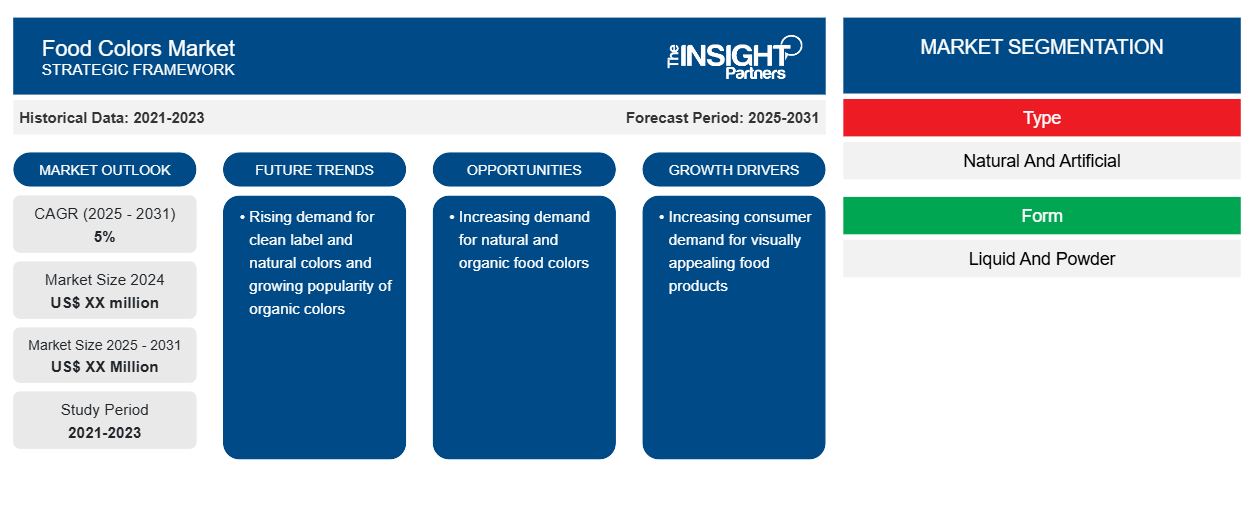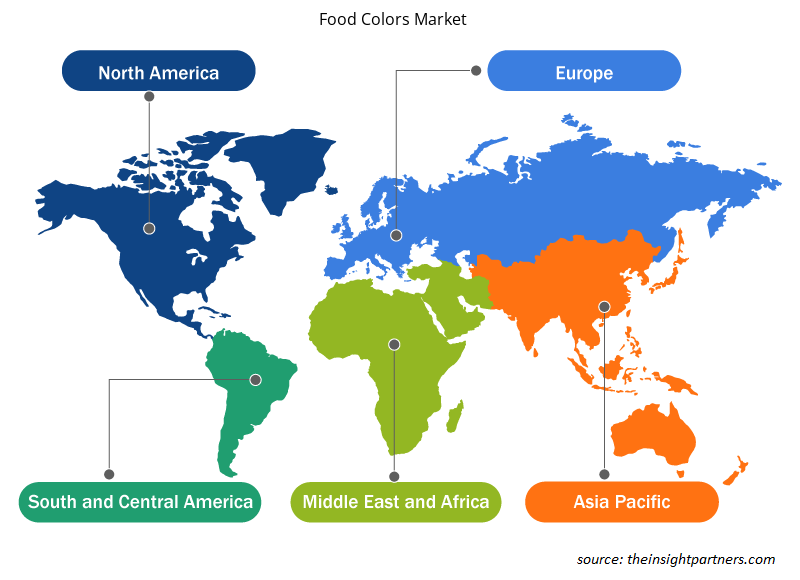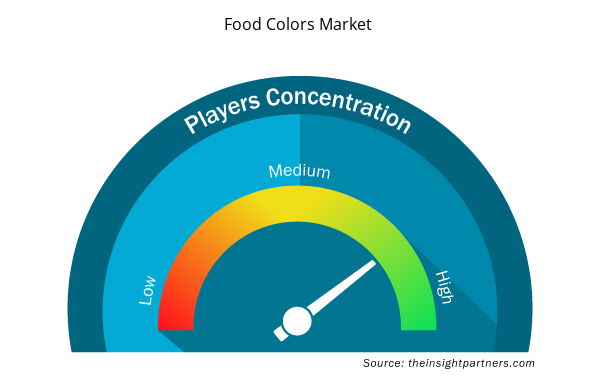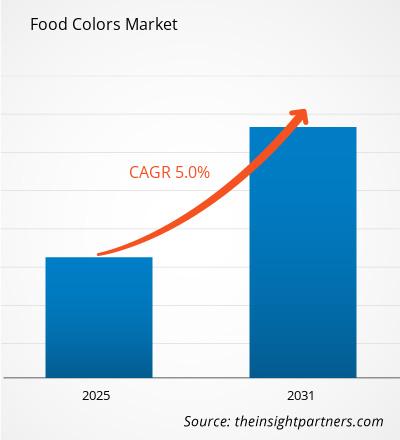The food colors market is expected to register a CAGR of 5% during 2023–2031. The rising demand for clean label and natural colors and growing popularity of organic colors are likely to remain a key trend in the market.
Food Colors Market Analysis
- The global food colors market is growing at a significant rate, the factors responsible for the same are increased demand for processed and convenience foods, consumer inclination for enhanced taste, texture and appearance, major driving factors for the same include rapid urbanisation, dietary changes and rising disposable income.
- The market is segmented by type, form and application.
- The application areas of food colors embrace a wide range of food products spanning bakery, confectionery, snacks, meat products among others.
- Major players in this sector are focusing on innovative product development, specifically clean label and organic colors keeping the steadfast increase in consumer demands for and long-shelf-life foods indirectly gaining ground for food colors market.
Food Colors Market Overview
- Food colors are additives used to enhance or modify the appearance of food and beverages.
- They can be broadly categorized into natural and synthetic colors. Natural food colors are derived from plant, animal, or mineral sources, such as beetroot, turmeric, carmine, and spirulina.
- These are increasingly popular due to consumer demand for clean-label products.
- Synthetic food colors, also known as artificial colors, are chemically produced and include compounds like Red 40, Yellow 5, and Blue 1. These often provide more vibrant and stable coloration but face scrutiny due to health concerns.
- Food colors come in various forms including liquids, powders, gels, and pastes.
Customize This Report To Suit Your Requirement
You will get customization on any report - free of charge - including parts of this report, or country-level analysis, Excel Data pack, as well as avail great offers and discounts for start-ups & universities
Food Colors Market: Strategic Insights

- Get Top Key Market Trends of this report.This FREE sample will include data analysis, ranging from market trends to estimates and forecasts.
Customize This Report To Suit Your Requirement
You will get customization on any report - free of charge - including parts of this report, or country-level analysis, Excel Data pack, as well as avail great offers and discounts for start-ups & universities
Food Colors Market: Strategic Insights

- Get Top Key Market Trends of this report.This FREE sample will include data analysis, ranging from market trends to estimates and forecasts.
Food Colors Market Drivers and Opportunities
Increasing consumer demand for visually appealing food products is expected to drive the growth of the food colors market
- The escalating consumer preference for visually appealing food products has emerged as a pivotal force propelling the expansion of the food colors market.
- This trend is multifaceted, influenced by various societal and technological factors.
- The ubiquity of social media platforms, particularly Instagram and Pinterest, has elevated food aesthetics to unprecedented levels, transforming meals into visual experiences that are shared globally.
- This digital showcase of food has heightened consumer expectations, compelling food manufacturers to prioritize the visual appeal of their products.
Increasing demand for natural and organic food colors
- The burgeoning demand for natural and organic food colors represents a pivotal opportunity in the food colors market, driven by a confluence of consumer preferences, regulatory pressures, and industry trends.
- This shift is rooted in growing health consciousness among consumers, who are increasingly wary of synthetic additives and seek products with clean, recognizable ingredients.
- The clean label movement has gained substantial momentum, compelling food manufacturers to reformulate their products using natural colorants derived from fruits, vegetables, and other plant-based sources.
- Regulatory bodies worldwide are tightening restrictions on artificial food additives, further catalyzing the transition towards natural alternatives.
Food Colors Market Report Segmentation Analysis
Key segments that contributed to the derivation of the food colors market analysis are type, form, and application.
- Based on type, the food colors market is divided into natural and artificial.
- Based on form, the food colors market is divided into liquid and powder.
- Based on application, the food colors market is segmented into bakery and confectionery, dairy and frozen desserts, beverages, RTC and RTE products, sauces dressings and condiments, meat poultry and seafood, and others.
Food Colors Market Share Analysis by Geography
- Food Colors Market Report comprises a detailed analysis of five major geographic regions, which includes current and historical market size and forecasts for 2021 to 2031, covering North America, Europe, Asia-Pacific (APAC), Middle East and Africa (MEA), and South & Central America.
- Each region is further sub-segmented into respective countries. This report provides analysis and forecasts of 18+ countries, covering food colors market dynamics such as drivers, trends, and opportunities that are impacting the markets at the regional level.
- Also, the report covers Porter’s Five Forces analysis, which involves the study of major factors that influence the food colors market in these regions.
Food Colors Market Regional Insights
The regional trends and factors influencing the Food Colors Market throughout the forecast period have been thoroughly explained by the analysts at Insight Partners. This section also discusses Food Colors Market segments and geography across North America, Europe, Asia Pacific, Middle East and Africa, and South and Central America.

- Get the Regional Specific Data for Food Colors Market
Food Colors Market Report Scope
| Report Attribute | Details |
|---|---|
| Market size in 2024 | US$ XX million |
| Market Size by 2031 | US$ XX Million |
| Global CAGR (2025 - 2031) | 5% |
| Historical Data | 2021-2023 |
| Forecast period | 2025-2031 |
| Segments Covered |
By Type
|
| Regions and Countries Covered | North America
|
| Market leaders and key company profiles |
Food Colors Market Players Density: Understanding Its Impact on Business Dynamics
The Food Colors Market market is growing rapidly, driven by increasing end-user demand due to factors such as evolving consumer preferences, technological advancements, and greater awareness of the product's benefits. As demand rises, businesses are expanding their offerings, innovating to meet consumer needs, and capitalizing on emerging trends, which further fuels market growth.
Market players density refers to the distribution of firms or companies operating within a particular market or industry. It indicates how many competitors (market players) are present in a given market space relative to its size or total market value.
Major Companies operating in the Food Colors Market are:
- Archer Daniels Midland Company
- Aromata Group Srl
- Döhler Gmbh
- Givaudan
- International Flavors and Fragrances Inc
- Kalsec Inc
Disclaimer: The companies listed above are not ranked in any particular order.

- Get the Food Colors Market top key players overview
Food Colors Market News and Recent Developments
The food colors market is evaluated by gathering qualitative and quantitative data post primary and secondary research, which includes important corporate publications, association data, and databases. A few of the developments in the food colors market are listed below:
- Phytolon and Ginkgo Bioworks Successfully Achieve First Milestone to Produce Vibrant Natural Food Colors via Two Producing Strains. (Source: Newsletter, Ginkgo Bioworks, Jan 2024)
- Oterra’s New Red and Pink natural color blends the smart ‘plant for plant’ option. (Source: Newsletter, Oterra’s, Jun 2023)
Food Colors Market Report Coverage and Deliverables
The “Food Colors Market Size and Forecast (2021–2031)” report provides a detailed analysis of the market covering below areas:
- Food colors market size and forecast at global, regional, and country levels for all the key market segments covered under the scope
- Food colors market trends as well as market dynamics such as drivers, restraints, and key opportunities
- Detailed PEST/Porter’s Five Forces and SWOT analysis
- Food colors market analysis covering key market trends, global and regional framework, major players, regulations, and recent market developments
- Industry landscape and competition analysis covering market concentration, heat map analysis, prominent players, and recent developments for the food colors market
- Detailed company profiles
- Historical Analysis (2 Years), Base Year, Forecast (7 Years) with CAGR
- PEST and SWOT Analysis
- Market Size Value / Volume - Global, Regional, Country
- Industry and Competitive Landscape
- Excel Dataset



Report Coverage
Revenue forecast, Company Analysis, Industry landscape, Growth factors, and Trends

Segment Covered
This text is related
to segments covered.

Regional Scope
North America, Europe, Asia Pacific, Middle East & Africa, South & Central America

Country Scope
This text is related
to country scope.
Frequently Asked Questions
The global food colors market is expected to grow at a CAGR of 5% during the forecast period 2023 - 2031.
Increasing consumer demand for visually appealing food products expected to drive the growth of the food colors market.
Rising demand for clean label and organic colors and growing popularity of functional colors to play a significant role in the global food colors market in the coming years.
The leading players operating in the food colors market are Archer Daniels Midland Company; Aromata Group Srl; Döhler Gmbh; Givaudan; International Flavors And Fragrances Inc; Kalsec Inc; Koninklijke Dsm Nv; Mane Kancor; Oterra A/S; and Sensient Colors Llc.
The report can be delivered in PDF/PPT format; we can also share excel dataset based on the request.
Some of the customization options available based on request are additional 3–5 company profiles and country-specific analysis of 3–5 countries of your choice. Customizations are to be requested/discussed before making final order confirmation, as our team would review the same and check the feasibility.
Trends and growth analysis reports related to Food and Beverages : READ MORE..
The List of Companies
1. ADM WILD Europe GmbH and Co. KG
2. BASF SE
3. Cargill, Incorporated.
4. Chr. Hansen Holding A/S
5. DDW The Colour House.
6. GNT Group B. V.
7. Koninklijke DSM N. V.
8. Naturex S. A.
9. San-Ei Gen F. F. I. ,Inc.
10. Sensient Colors LLC

 Get Free Sample For
Get Free Sample For